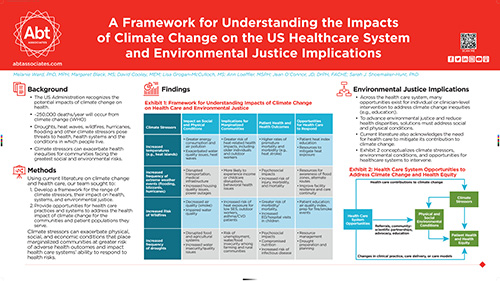Climate Change Impacts on Environmental Justice and the U.S. Healthcare System
Poster
The authors synthesized peer-reviewed and “gray” literature to obtain a robust understanding of a) climate stressors, b) their impact on health and health system infrastructure, c) environmental justice implications and d) opportunities for health care practices and systems to respond. Using their findings, they created a framework to identify key climate stressors and associated health impacts, including increases in the frequency of extreme weather events, risk of wildfires, frequency of droughts, and temperatures resulting in heat islands and other hazards. In addition to impacts on patient health outcomes—such as higher rates of morbidity and mortality, increased hospital visits, and psychosocial impacts—climate stressors disproportionately affect communities facing inequities by exacerbating inequitable social and environmental conditions. For example, impacts on water and air quality, transportation, housing, and agricultural systems have the potential to worsen conditions for marginalized and rural communities (e.g., water/food insecurity, work and childcare disruptions, health outcomes). To advance environmental justice and equity, health care system responses to climate stressors must involve interventions to address the social determinants of health.
Click the image below to download a PDF:

